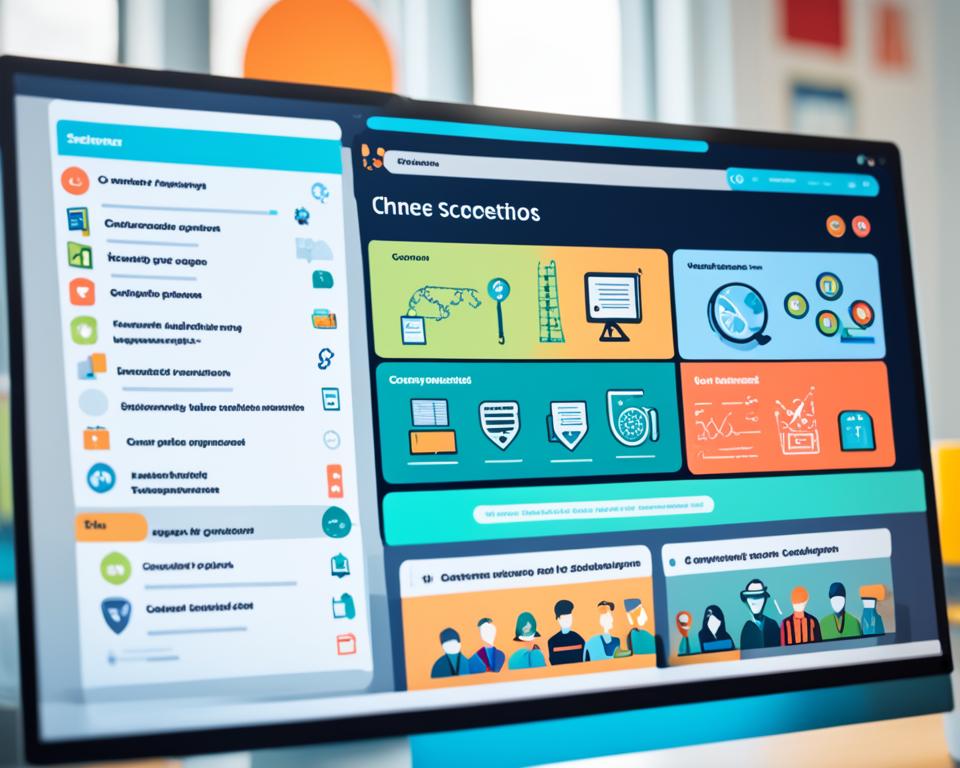Online learning has become increasingly popular in recent years, offering students a flexible and convenient way to pursue their education. However, it is important to consider both the advantages and drawbacks of online learning before making a decision.
When it comes to the benefits, online learning provides students with the flexibility to create their own study schedule and learn at their own pace. Whether they are working professionals or have other commitments, online classes allow students to balance their education with their busy lives. Additionally, online learning eliminates the need for commuting to a physical campus, providing students with the ability to attend classes from anywhere.
Another advantage of online learning is the cost-effectiveness. Tuition fees for online programs are often lower compared to traditional on-campus classes, and students can save on expenses such as textbooks and commuting costs. Furthermore, online learning offers access to a wider range of programs and courses, providing students with more options to explore and tailor their education to their interests and career goals.
Despite these benefits, there are also drawbacks to consider. One of the main challenges of online learning is the lack of physical interaction. Unlike traditional on-campus classes, online learning does not offer face-to-face communication and social interactions, which can lead to feelings of isolation. Additionally, staying motivated can be difficult in an online learning environment, as it requires self-discipline and structure to avoid distractions and maintain productivity.
Key Takeaways:
- Online learning offers flexibility, allowing students to create their own study schedule and learn at their own pace.
- It provides the convenience of attending classes from anywhere, eliminating the need for commuting to a physical campus.
- Online learning is often more cost-effective, with lower tuition fees and savings on expenses like textbooks and commuting costs.
- Students have access to a wider range of programs and courses, providing more options to tailor their education.
- However, online learning lacks physical interaction and can be challenging to stay motivated in an independent learning environment.
Advantages of Online Learning
Online learning offers numerous benefits that make it an appealing option for students seeking flexibility, convenience, and a customizable learning experience. Whether you’re a working professional looking to advance your career or a busy individual with multiple responsibilities, online education provides advantages that cater to your unique needs and goals.
Flexible Scheduling
One of the primary advantages of online learning is the flexibility it offers in terms of scheduling. Unlike traditional on-campus classes with fixed timetables, online courses allow you to create your own study schedule. This means you can attend classes and complete coursework at a time that suits you best, allowing for better work-life balance and the ability to manage your other commitments effectively.
Location Independence
With online learning, you have the freedom to attend classes from anywhere in the world. Whether you’re at home, at work, or traveling, all you need is a stable internet connection. This accessibility removes geographical constraints and allows you to access quality education regardless of your physical location.
Lower Tuition Fees
Another advantage of online learning is its cost-effectiveness. Online programs generally have lower tuition fees compared to traditional on-campus courses. Additionally, you can save on additional expenses such as commuting, housing, and textbooks. This affordability makes online education an attractive option for students seeking a high-quality education without breaking the bank.
Wide Range of Programs and Courses
Online learning provides access to a diverse range of programs and courses that cater to various interests and career paths. From accredited degree programs to professional certifications, you can choose from a plethora of options that align with your educational and professional goals. This extensive selection ensures that you can find the right program to suit your needs.
Self-Paced Learning
One of the key advantages of online learning is the ability to learn at your own pace. Unlike traditional classroom settings, online courses allow you to review materials, revisit lectures, and complete assignments on your own time. This personalized learning experience ensures that you can fully comprehend and grasp the content at a pace that suits your learning style.
Perfect Fit for Working Professionals
Online learning offers significant advantages for working professionals. It allows you to balance work and education seamlessly, as you can choose when and where to study. This means that you can continue working while pursuing a degree, upskilling, or learning new career-related skills. The flexibility of online education enables you to advance in your current career or transition into a new field without sacrificing your work commitments.
Online learning provides numerous benefits, including flexible scheduling, location independence, lower tuition fees, a wide range of programs and courses, self-paced learning, and advantages for working professionals. These advantages make online education a compelling option for those seeking a more convenient, affordable, and personalized learning experience.
Disadvantages of Online Learning
While online learning offers numerous benefits, it is important to recognize that there are also some drawbacks to consider. This section will explore the disadvantages of online learning and help you make an informed decision about this mode of education.
The Lack of Physical Interaction
One of the significant drawbacks of online learning is the absence of face-to-face interaction. Unlike traditional on-campus classes, online students miss out on the opportunity to engage in direct physical interaction with their peers and instructors. This lack of personal connection can sometimes lead to feelings of isolation and a limited sense of community.
Difficulty in Staying Motivated
Another challenge students face in online learning is maintaining motivation. With the flexibility and independence that online classes provide, it can be harder to stay focused and engaged. Without the presence of a physical classroom and classmates, self-discipline becomes crucial to avoid distractions and maintain productivity.
Limited Access to Resources and Support
Compared to traditional on-campus classes, online learning may offer limited access to resources and support. Students may encounter obstacles such as internet connectivity issues, software compatibility problems, or technical difficulties that hinder their ability to access classes and resources effectively. It is essential to choose an online university that provides direct access to comprehensive resources and reliable support systems to navigate these challenges.
Technical Difficulties
Technical difficulties can also be a disadvantage of online learning. Students may experience issues with their internet connection, software glitches, or compatibility problems that disrupt their learning experience. Troubleshooting these technical problems can be frustrating and time-consuming, potentially affecting the overall educational experience.
“Online learning has its limitations, and it’s crucial to be aware of the challenges that come with it. However, with the right mindset, self-discipline, and support systems, these disadvantages can be effectively managed.”
Considering the disadvantages discussed above, it is important to weigh the pros and cons of online learning before making a decision. By understanding these drawbacks, you can better determine if online learning aligns with your learning style, goals, and preferences.
Continue reading to explore more aspects of online learning.
Flexibility and Work-Life Balance
One of the major advantages of online learning for working professionals is the flexibility it offers in terms of balancing work and education. Online classes allow individuals to study at their own pace and attend classes from anywhere, making it easier to continue working while pursuing a degree. This flexibility is especially beneficial for those who have full-time jobs or other commitments.
“Online learning has been a game-changer for me in terms of work-life balance. Being able to study on my own schedule and not having to commute to a physical campus has given me the freedom to advance my education while still excelling in my career.”
With online learning, professionals have the ability to create a personalized study schedule that fits around their work and other responsibilities. They can access course materials and lectures at any time, allowing them to study during their free hours or even on weekends. This flexibility enables them to pursue their educational goals without compromising their work-life balance.
Efficient Time Management
Online learning also promotes efficient time management. Working professionals can prioritize their work tasks and allocate specific time slots for studying. They have the freedom to pause and resume course materials based on their availability, ensuring maximum productivity. Additionally, online learning eliminates the wasted time spent commuting to and from physical campuses, allowing professionals to make the most of their valuable time.
The Benefits of Remote Learning
Remote learning, a key component of online education, offers working professionals the opportunity to access high-quality education without the need to relocate or disrupt their current work arrangements. The
option to work remotely while pursuing a degree provides a seamless integration of professional and educational commitments.
Learning at Your Own Pace
Another advantage that online learning provides for working professionals is the ability to learn at their own pace. In traditional classroom settings, the pace of learning is often dictated by the instructor and the collective progress of the entire class. However, with online learning, professionals can dedicate more time to challenging topics or accelerate through familiar material. This personalized approach allows them to absorb and retain knowledge more effectively.
| Advantages | Disadvantages |
|---|---|
|
|
Accessibility and Convenience
One of the key advantages of online learning is the accessibility it offers to students. With online classes, students have the convenience of attending classes from any location, whether it’s from the comfort of their own homes, a local coffee shop, or while traveling. This flexibility eliminates the need for commuting to a physical campus, saving valuable time and resources.
Moreover, online learning provides students with the convenience of accessing course materials at any time. They can review lectures, readings, and assignments whenever it fits their schedule, allowing for personalized learning and accommodating various commitments. Whether they are early birds or night owls, online students have the freedom to engage with their coursework at their optimal learning times.
Furthermore, the accessibility and convenience of online learning make it an attractive option for individuals who may not have access to on-campus education due to geographical constraints or other limitations. Students living in remote areas or those with physical disabilities can pursue higher education without the need to relocate or overcome physical barriers. Online learning extends educational opportunities to anyone with an internet connection.
Benefits of Accessibility and Convenience in Online Learning
“Online learning provides the accessibility and convenience that traditional education often lacks. It allows students to learn from anywhere and at their own pace, removing geographical and time limitations.” – Amanda Johnson, Education Specialist
The accessibility and convenience of online learning empower students to take control of their education and build a learning experience that suits their individual needs, whether they are working professionals, parents, or individuals with other commitments. By providing flexibility and eliminating barriers, online learning opens up a world of opportunities for those seeking a quality education.
| Benefits of Accessibility and Convenience | Description |
|---|---|
| Flexibility in location | Attend classes from any location |
| 24/7 access | Access course materials at any time |
| Overcome geographical limitations | Opportunity for remote students or those with limited access to on-campus education |
Whether it’s the ability to learn from the comfort of one’s home or the flexibility to access materials at any hour, online learning prioritizes convenience and accessibility for a diverse range of students. These advantages make online learning a practical and inclusive option in the ever-evolving landscape of education.
Cost-Effectiveness
Online learning offers a cost-effective alternative to traditional on-campus classes. Students can save on various expenses, making education more affordable and accessible.
One of the significant cost savings in online learning is the elimination of commuting expenses. Students can attend classes from the comfort of their homes, eliminating the need for transportation costs. This not only saves money but also reduces the time spent commuting, allowing students to allocate more time to their studies.
Another financial benefit of online learning is the reduced cost of textbooks. Many online courses provide digital materials, which are often more affordable or even free compared to traditional print textbooks. This helps students save money while still obtaining the required resources for their studies.
Additionally, online learning eliminates the need for relocation costs. Students can pursue their education from any location, allowing them to avoid the expenses associated with moving to a campus. This is particularly advantageous for individuals who live in remote areas or have commitments that prevent them from relocating.
Furthermore, many online programs have lower tuition fees compared to their on-campus counterparts. Online universities often have lower operational costs, allowing them to offer competitive pricing for their courses. Lower tuition fees make online education a more affordable option, especially for individuals on a tight budget.
In conclusion, online learning provides a cost-effective approach to education by reducing expenses such as commuting, textbooks, relocation, and offering lower tuition fees. These cost savings make online education a more accessible and affordable choice for students.

Average Savings Comparison
| Expense | On-Campus Classes | Online Learning | Savings |
|---|---|---|---|
| Commuting | $500 per semester | $0 | $500 |
| Textbooks | $1,000 per year | $200 per year | $800 |
| Relocation | $5,000 | $0 | $5,000 |
| Tuition Fees | $10,000 per year | $7,000 per year | $3,000 |
Personalized Learning Experience
Online learning offers a personalized learning experience that allows students to learn at their own pace. This flexibility empowers individuals to review course material as needed, progress through the coursework at a comfortable speed, and customize their learning journey according to their unique needs and learning style.
With online classes, students have the freedom to revisit challenging topics, spend more time on areas that require further understanding, and accelerate through familiar concepts. This level of personalization ensures that learners fully grasp the subject matter before moving on, building a solid foundation for future learning.
The ability to learn at one’s own pace is particularly beneficial for students who prefer a more in-depth understanding of the material. It allows them to delve deeper into topics that pique their interest or require additional exploration. On the other hand, students who grasp concepts quickly can move through the coursework efficiently, saving time and gaining a head start in their studies.
Online classes provide a wide array of resources and tools to enhance the learning experience. Students can access interactive multimedia content, participate in virtual simulations, engage in discussions with peers and instructors, and take advantage of online learning platforms that offer personalized feedback and tailored recommendations.
This personalized learning experience fosters individual growth, deepens comprehension, and encourages a sense of ownership over one’s education. By catering to diverse learning styles and preferences, online learning ensures that students receive a customized educational journey that maximizes their potential.
“Online learning allows me to learn at my own pace and really understand the material. I can go back, review the content, and ask questions when needed. It’s like having a personal tutor guiding me through the coursework.” – Lisa Thompson, Online Student
Lack of Physical Interaction
One of the major drawbacks of online learning is the lack of physical interaction. In traditional on-campus classes, students have the opportunity to engage in face-to-face communication and foster meaningful social interactions. This personal interaction creates a sense of belonging and community that is often absent in online learning environments.
Without the ability to physically interact with classmates and instructors, online learners may experience a sense of isolation and disconnection. The absence of non-verbal cues and immediate feedback can hinder effective communication and collaborative learning.
Moreover, the limited face-to-face communication in online learning can make it challenging for students to establish strong relationships and build a network of peers and mentors. The casual conversations and spontaneous interactions that occur in traditional classrooms often contribute to the development of lifelong connections and support systems.
However, it is worth noting that online universities are aware of this challenge and strive to provide support systems and online communities to mitigate the lack of physical interaction. These support systems can help students connect with their peers, engage in virtual group projects, and participate in online discussions. By fostering a sense of community and belonging, online universities aim to compensate for the absence of in-person interaction.
Online Support Systems and Communities
An important aspect of online learning is the presence of support systems and online communities that help bridge the gap of physical interaction. These resources can provide a sense of connection and support, allowing students to engage in discussions, ask questions, and receive guidance from instructors and peers alike.
“Online support systems and communities play a crucial role in creating a virtual classroom environment that encourages interaction and collaboration among students.”
Through virtual platforms such as discussion forums, chat rooms, and video conferences, students can communicate, share ideas, and seek assistance when needed. These online interactions facilitate knowledge exchange and foster a sense of camaraderie, enabling students to overcome the challenges posed by the lack of physical interaction.
While it may not fully replicate the experience of in-person interaction, the availability of online support systems and communities can significantly enhance the learning journey of online students and create a sense of connectedness that helps counterbalance the absence of face-to-face communication.

Difficulty in Staying Motivated
One of the challenges that students often face in online classes is difficulty staying motivated. The flexibility and independence of virtual education can make it tempting to procrastinate or become easily distracted. Without the structure and accountability of a physical classroom, it requires self-discipline and focus to maintain productivity.
Staying motivated in online classes requires:
- Creating a study schedule: Developing a consistent study routine can help students stay on track and avoid distractions. Setting specific times for studying can create a sense of structure and promote better time management.
- Setting goals: Establishing clear goals can provide a sense of direction and purpose. Whether it’s completing assignments by a certain deadline or mastering a particular topic, having goals in mind can help students stay motivated and focused on their progress.
- Eliminating distractions: Minimizing distractions is crucial for maintaining focus during online classes. This may involve turning off notifications on electronic devices, finding a quiet study space, or using website blockers to prevent access to non-educational websites or apps.
- Engaging with the material: Actively engaging with the course material can help students stay motivated. Taking notes, asking questions, participating in online discussions, and seeking a deeper understanding of the content can enhance motivation and overall learning experience.
- Seeking support: Having a support system, such as study coaches or online communities, can play a vital role in staying motivated. Connecting with fellow students facing similar challenges and sharing experiences can provide encouragement, accountability, and motivation.
Remember, staying motivated in online classes requires self-discipline, time management, and active engagement. By implementing strategies like creating a study schedule, setting goals, eliminating distractions, engaging with the material, and seeking support, students can overcome the difficulties and maintain focus in the virtual education environment.
| Challenge | Strategies to Stay Motivated |
|---|---|
| Flexibility and independence | Create a study schedule, set goals, eliminate distractions, actively engage with the material, and seek support. |
Limited Access to Resources and Support
While online learning offers numerous benefits, one of the challenges students may encounter is limited access to resources and support compared to traditional on-campus classes. This limitation can arise from various factors, such as internet connectivity issues, software compatibility problems, or technical difficulties that hinder students’ ability to access classes and necessary resources.
When students face these challenges, it is crucial to have direct access to resources and support in order to ensure a smooth and successful learning experience. Online universities that prioritize the needs of their students will provide comprehensive support systems aimed at addressing these obstacles and enhancing the overall educational journey.
Overcoming Technical Difficulties
In the realm of online learning, technical difficulties can impede students’ progress and hinder their access to essential resources. Whether it be intermittent internet access, compatibility issues with platforms and software, or glitches in the learning management systems, these challenges can cause frustration and disrupt the learning process.
Quality online universities take proactive measures to alleviate these technical burdens by offering dedicated technical support. They have teams of IT professionals readily available to assist students in troubleshooting and resolving technical issues promptly, ensuring uninterrupted access to classes, materials, and other necessary resources.
Building Robust Online Libraries
One critical aspect of a successful online learning experience is having access to a diverse range of resources, including textbooks, academic journals, and research materials. While physical libraries are a staple of traditional on-campus institutions, online universities compensate for this by building robust digital libraries.
Online universities partner with publishers, research institutions, and digital libraries to provide their students with extensive collections of online resources. These virtual libraries encompass e-books, scholarly articles, multimedia materials, and other digital resources, enabling students to access comprehensive information relevant to their studies.
Responsive Academic Support Services
Academic support is pivotal in fostering a successful learning environment. Online universities recognize the importance of providing students with prompt and responsive assistance when it comes to their academic journey. These institutions typically offer a range of academic support services, including virtual tutoring, writing centers, and subject-specific consultations.
Through easy-to-use online platforms, students can schedule virtual appointments with knowledgeable tutors, who will guide them through challenging subjects or assist in developing effective study strategies. Additionally, many online universities have discussion boards and online communities where students can interact with peers and faculty members to seek guidance and support.
Comparing Resources and Support in Online Learning vs. Traditional On-Campus Classes
| Categories | Online Learning | Traditional On-Campus Classes |
|---|---|---|
| Access to Resources | Direct access to online libraries and digital resources | Access to both physical and digital libraries |
| Technical Support | Dedicated IT support for immediate resolution of technical difficulties | IT support available, but response times may vary |
| Academic Support | Virtual tutoring, writing centers, and subject-specific consultations | Face-to-face tutoring, in-person writing centers, and consultation services |
By comparing the resources and support available in online learning with those in traditional on-campus classes, it becomes clear that while online learning may have its limitations, it also offers innovative solutions to address these challenges. The key is to choose an online university that prioritizes providing comprehensive resources and robust support systems, thus ensuring a rewarding educational experience for students.

Conclusion
Online learning has transformed education, offering a range of benefits and drawbacks that students must carefully consider. The advantages of online learning cannot be overlooked, as it provides flexibility, convenience, and cost-effectiveness. Students can access a wide range of programs, learn at their own pace, and attend classes from anywhere. However, there are also disadvantages to virtual education, such as the lack of physical interaction, difficulty in staying motivated, limited access to resources, and technical difficulties. These drawbacks should be carefully weighed against the benefits when making a decision.
Despite the challenges, online learning has proven to be a valuable option for many individuals. It allows working professionals to balance their work and education, provides accessibility and convenience for those with busy lifestyles, and offers a personalized learning experience. Online universities often provide support systems and online communities to help students overcome the lack of physical interaction and feelings of isolation.
Ultimately, whether online learning is the right choice for an individual depends on their unique circumstances, preferences, and goals. It is crucial to consider the benefits and drawbacks of virtual education, weigh them against one’s personal needs, and make an informed decision. With the right mindset and support, online learning can be a rewarding and successful educational experience.
FAQ
What are the benefits and drawbacks of online learning for students?
Online learning offers several benefits, including flexibility in scheduling, the ability to attend classes from anywhere, lower costs compared to traditional on-campus classes, access to a wider range of programs, and the ability to learn at one’s own pace. However, there are also drawbacks, such as the lack of physical interaction, difficulty in staying motivated, limited access to resources and support, technical difficulties, and feelings of isolation.
What are the advantages of online learning?
The advantages of online learning include flexible scheduling, the ability to attend classes from anywhere, lower tuition fees, cost-effectiveness, access to a wider range of programs and courses, and the ability to learn at one’s own pace. Online learning also offers benefits for working professionals, as it allows them to balance work and education, continue working while pursuing a degree, advance in their current career, and take classes at any time and from any location.
What are the disadvantages of online learning?
The disadvantages of online learning include the lack of physical interaction, difficulty in staying motivated, limited access to resources and support compared to traditional on-campus classes, technical difficulties, and feelings of isolation. It is important to consider these disadvantages when making a decision about online learning.
How does online learning benefit working professionals?
One of the major advantages of online learning for working professionals is the flexibility it offers in terms of balancing work and education. Online classes allow individuals to study at their own pace and attend classes from anywhere, making it easier to continue working while pursuing a degree. This flexibility is especially beneficial for those who have full-time jobs or other commitments.
What are the accessibility and convenience benefits of online learning?
Online learning offers students the accessibility of time and place in education. They can attend classes from any location and access course materials at any time. This flexibility and convenience make online learning an attractive option for those who may not have access to on-campus education or have other commitments that make attending traditional classes difficult.
How does online learning help in terms of cost-effectiveness?
Online learning is often more cost-effective than traditional on-campus classes. Online students can save on expenses like commuting, textbooks, and relocation costs. Additionally, many online programs have lower tuition fees compared to their on-campus counterparts. This cost-effectiveness makes online learning a more affordable option for many students.
How does online learning provide a personalized learning experience?
Online learning allows for a personalized learning experience, as students can learn at their own pace. This flexibility allows individuals to review material as needed, move through the coursework at their own speed, and tailor their learning experience to their unique needs and learning style. Online classes also offer a wide range of resources and tools to enhance the learning experience.
What are the drawbacks of online learning in terms of physical interaction?
One of the major drawbacks of online learning is the lack of physical interaction. Students miss out on the face-to-face communication and social interactions that are common in traditional on-campus classes. This can lead to feelings of isolation and a lack of community. However, online universities often provide support systems and online communities to help students overcome this challenge.
How can students overcome the difficulty in staying motivated in online learning?
Another drawback of online learning is the difficulty in staying motivated. With the flexibility and independence of online classes, students may find it challenging to stay focused and engaged. It requires self-discipline and structure to avoid distractions and maintain productivity. Having support systems, such as study coaches or online communities, can help students overcome this challenge.
What are the limitations in terms of resources and support in online learning?
Online learning sometimes offers limited access to resources and support compared to traditional on-campus classes. Students may face difficulties with internet connectivity, software compatibility, or technical issues that hinder their ability to access classes and resources. It is essential to choose an online university that provides direct access to resources and support to ensure a smooth learning experience.
How should online learning be approached considering its benefits and drawbacks?
Online learning offers numerous benefits, such as flexibility, convenience, cost-effectiveness, access to a wide range of programs, and the ability to learn at one’s own pace. However, there are also drawbacks, including the lack of physical interaction, difficulty in staying motivated, limited access to resources and support, technical difficulties, and feelings of isolation. It is important for students to carefully consider these factors when deciding whether online learning is the right option for them.





